
In a recent addition to the Libertarian Tradition podcast series, part of the Mises Institute’s online media library, Jeff Riggenbach uses Objectivist Robert Bidinotto’s novel Hunter as a launchpad to discuss Objectivist subculture and fear.
You can also read the transcript below:
In a recent conversation with a younger libertarian, I heard something that I found somewhat surprising and somewhat disturbing at the same time. But later, on reflection, I realized that what I had heard should not have surprised me, however much it may still disturb me. My young friend had said, and I paraphrase here, that he was surprised to learn that I thought of Objectivists as libertarians at all. Based on what he had seen of the positions they took on political issues, especially foreign policy, he had concluded that they were just another kind of neocon.
I refer to this younger libertarian as “my young friend,” but the fact is, he’s no kid; he’s in his early 40s, which tells you how long the situation with respect to Objectivism that I’m going to describe and deplore has been going on — that a man in his 40s cannot remember a time when leading Objectivists didn’t talk in such a way about questions of US foreign policy (and about other questions as well, as we shall see) that they become hard to differentiate from certain kinds of conservatives and hard to see as any sort of libertarian.
But before I get further into that depressing theme, there’s a new book I’d like to commend to your attention. It’s a novel entitled Hunter: A Thriller, and it’s the work of the prominent Objectivist writer Robert Bidinotto. Now, a word of caution. What follows is not properly a book review, because what I’m really interested in talking about here is not Bidinotto’s thriller in its capacity as a novel, an entertainment, a work of “popular art,” but rather what it can tell us in its capacity as a cultural artifact.
[continue reading…]
Help Promote Prometheus Unbound by Sharing this Post
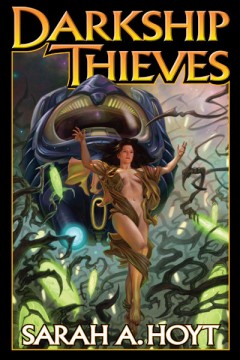
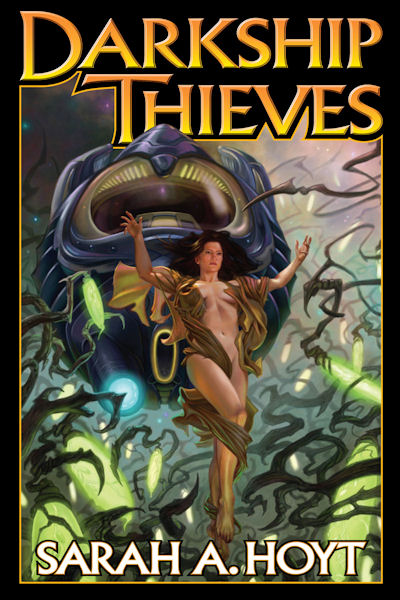 The Libertarian Futurist Society has announced this year’s winners of their Best Novel and Hall of Fame awards.
The Libertarian Futurist Society has announced this year’s winners of their Best Novel and Hall of Fame awards.
Alas, I didn’t get around to reading and reviewing Cory Doctorow’s For the Win in time for the voting, but I still plan on doing so. Matthew Alexander reviewed another of the finalists, L. Neil Smith’s Ceres.
Here’s the official press release:
The Libertarian Futurist Society will hold its annual awards ceremony for the Prometheus Award during Renovation, the 69th World Science Fiction Convention, to be held Aug. 17-21 in Reno, Nevada. The specific time and location will be available in the convention program.
The winner of the Best Novel award is Darkship Thieves, by Sarah Hoyt (Baen Books). The Hall of Fame award was won by Animal Farm, a short novel written by George Orwell in 1945. Sarah Hoyt will receive a plaque and a one-ounce gold coin, while a smaller gold coin and a plaque will be presented to Orwell’s estate.
Darkship Thieves features an exciting, coming-of-age saga in which a heroic woman fights for her freedom and identity against a tyrannical Earth. Hoyt’s novel, dedicated to Robert A. Heinlein, depicts a plausible anarchist society among the asteroids. Hoyt is a prolific writer of novels and short fiction, though this is her first time as Prometheus finalist.
[continue reading…]
Help Promote Prometheus Unbound by Sharing this Post
- Brian Defferding (?) over at Practical Praxeology tells us “Why The Hitchhiker’s Guide to the Galaxy is Better Atheist Libertarian Literature than Any Ayn Rand Book.” Do you agree?
- Digital publishing, tablets, ereaders, and the changing genre publishing landscape:
- Wired – Epicenter: “Digital Book Publishing Models to the Rescue.” A few of the interesting business models that are emerging, including J.K. Rowling’s for the ebooks of the Potter series.
- Wired – Epicenter: “Are Tablets Killing E-Readers? Um, No….”
- Adventures in Scifi Publishing podcast #124: Fascinating interview with multi-genre author Kristine Kathryn Rusch about how digital publishing is changing the genre publishing landscape and stirring up controversy: outdated accounting practices, publisher undercounting of ebook sales, shady new agent practices (including one mentioned in the first Wired article above) and whether you even need or should get an agent now, publishing and agent contracts, foreign rights, ebook rights, IP lawyers, and so on. If this podcast episode piques your interest, be sure to check out Kris’s Business Rusch series of blogposts for more on these topics.
Help Promote Prometheus Unbound by Sharing this Post
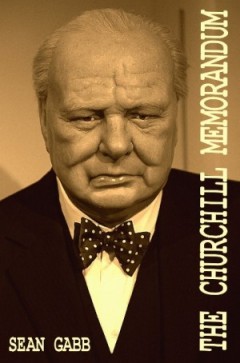
I recently read The Churchill Memorandum, by English libertarian Sean Gabb. I devoured most of it on a transatlantic flight, and finished the last bit on terra firma. I tend to like thrillers (some favorite authors include Nelson DeMille and, of late, Cherie Priest, author of Bloodshot); alternate history (e.g., Harry Turtledove, Brad Linaweaver’s Moon of Ice, L. Neil Smith’s The Probability Broach); and books with libertarian themes or influences (L. Neil Smith, Ayn Rand, Henry Hazlitt, Brad Linaweaver, Victor Koman, J. Neil Schulman). So it’s no surprise I enjoyed The Churchill Memorandum, which is very well written and which combines all three features (full disclosure: Gabb is a friend).
The novel is set in 1959, in an alternate history in which Hitler died in a car accident in 1939, thus averting WWII and changing the course of history. Gabb’s libertarian influences — he’s the head of the UK Libertarian Alliance — as well as his deep historical knowledge, are evident throughout the book. The novel depicts amazing technological progress — some of it rivaling or exceeding 2011 levels — in 1959, since WWII did not occur to sap away the economic strength and entrepreneurial innovations of tens of millions of individuals who would otherwise have been eviscerated in state war. So in 1959 there are magnetic bullet trains, home energy generators, and many other seemingly fantastic innovations.
The story follows the adventures of one Anthony Markham, a Churchill historian who, on a trip to the now-fascist police-state and isolationist America to research the Churchill archives at Harvard, stumbles across an explosive document that purports to document secret pacts that changed the course of American and world history. This leads to an intriguing geopolitical thriller informed by the author’s libertarian views. It is told in first person point of view (POV), my personal favorite for thrillers (and other novels) since it forces the narrator to show not tell, and not to omnisciently cheat and reveal details the protagonist would not know. Gabb’s ambivalent and somewhat bipolar English attitude towards America — at once a great power and friend of England, and a schizophrenic and dangerous destroyer of the ancient European order and institutions — is present throughout; and as a skeptic of the American mythos myself, I really enjoyed this foreign perspective. (Gabb recently presented a talk on “The Case Against the American War of Independence.”)
[continue reading…]
Help Promote Prometheus Unbound by Sharing this Post
With the recent release of the first part of the film adaptation of Atlas Shrugged (see Matthew’s review), the Institute for Humane Studies (IHS) — via LearnLiberty.org — brings us this interview with Professor Jennifer Burns, author of Goddess of the Market: Ayn Rand and the American Right, on how Ayn Rand fits into the classical liberal tradition.
In this video, Prof. Burns explains three classical liberal themes in Ayn Rand’s masterpiece Atlas Shrugged: individualism, suspicion of centralized power, and free markets. These themes come to life through the novel’s plot and characters and give the reader an opportunity to imagine a world where entrepreneurship has been stifled by regulations and where liberty has been traded for security. Burns ends by reviving Rand’s critical question: do you want to live in this kind of world?
[continue reading…]
Help Promote Prometheus Unbound by Sharing this Post
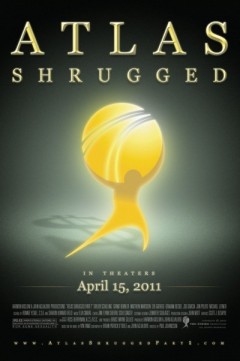
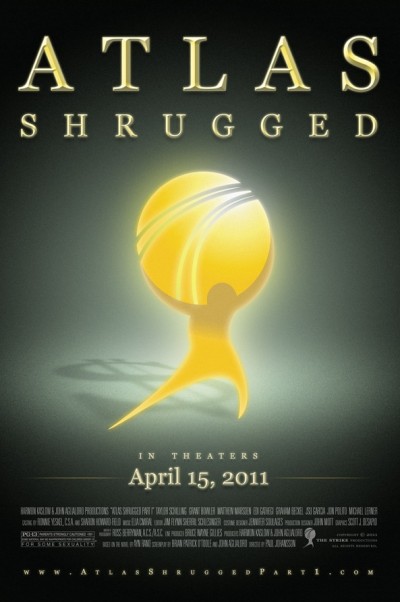 In Ayn Rand’s novel Atlas Shrugged, the first time we meet Dagny Taggart is on the Taggart Comet. The scene comes alive as Rand’s pen reveals the details such that the reader feels as if he is there. When Dagny awakens from a nap to discover the train has stopped, she gets off to investigate. Ayn Rand writes:
In Ayn Rand’s novel Atlas Shrugged, the first time we meet Dagny Taggart is on the Taggart Comet. The scene comes alive as Rand’s pen reveals the details such that the reader feels as if he is there. When Dagny awakens from a nap to discover the train has stopped, she gets off to investigate. Ayn Rand writes:
There was a cold wind outside, and an empty stretch of land under an empty sky. She heard weeds rustling in the darkness. Far ahead, she saw figures of men standing by the engine—and above them, hanging detached in the sky, the red light of a signal.
I have often thought Rand would have made an excellent director, and in that single paragraph we can see some of her talent. She appeals to three senses and evokes compelling images in our heads. A director, location scout, sound engineer, set designer, and cinematographer intent on filming such a scene have half their work done for them already. Let us hear the weeds but not see them; let us see Dagny shiver once and hold her coat tighter to her body; let us see a long shot of silhouettes of men bathed in red light from the stoplight that seems to float in the dark sky above them. The appropriate shots present themselves, practically instructing the director.
Before the stop, Dagny hears a brakeman whistling a tune she just knows was composed by Richard Halley.
“Tell me please what are you whistling?”
…
“It’s the Halley Concerto,” he answered, smiling.
“Which one?”
“The Fifth.”
She let a moment pass before she said slowly and very carefully, “Richard Halley wrote only four concertos.”
The boy’s smile vanished… “Yes, of course,” he said. “I’m wrong. I made a mistake.”
This early scene, which I find excellent and a great mood setter for the rest of the book, is absent from the movie. So too is any trace of the talent for storytelling present in it.
[continue reading…]
Help Promote Prometheus Unbound by Sharing this Post
- From io9 comes this story of a supermodel brainwashed to work for the CIA:
In the movie Salt, Angelina Jolie plays a double-agent who is mind-controlled by scary remnants of the USSR secret service. And in real life, the 1940s bombshell Candy Jones was apparently brainwashed with drugs and used as a CIA covert operative. At least, according to testimony that Jones gave while under hypnosis, after her husband realized that she was acting strangely and seemed to have a split personality. Several years ago, the Fortean Times described what Jones reported while hypnotized: More »
- To critics of Ayn Rand’s Atlas Shrugged who sneeringly intone that her plot and villains are unrealistic, John Stossel observes:
Joe Biden Railroad
It’s amazing how modern politics resembles scenes of Ayn Rand’s best-seller Atlas Shrugged.
Like the one in which a high-ranking government official pumps millions of dollars into a failing railroad company. The grateful railroad CEO rewards the government official by renovating his hometown train station and naming it after the government official. The renovation costs $5,700,000 more than expected.
Then comes the ribbon cutting ceremony. The CEO gets on one of his trains to go to the ceremony, but it breaks down. No surprise there: One out of every four trains his company runs is late [pdf]. The CEO, chuckling at the irony, abandons the train and takes a car to the ceremony.
Unfortunately, that wasn’t a scene in Atlas Shrugged. It happened this weekend.
The government official is Joe Biden.
By the way, the first of three Atlas Shrugged movies opens next month, appropriately on April 15th.

Do you know of any other examples?
Help Promote Prometheus Unbound by Sharing this Post














